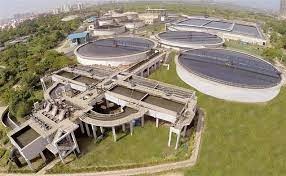 Image Source : Water Digest
Image Source : Water Digest
The city of Gurgaon is preparing to enhance its urban infrastructure with the planned development of a new sewage treatment plant (STP). This ambitious project reflects the local government’s commitment to improving water management, environmental sustainability, and public health in one of India’s rapidly growing urban centers. The forthcoming sewage treatment facility is expected to effectively address wastewater disposal challenges and contribute to the city’s overall ecological balance.
Key Highlights Of The Sewage Treatment Plant Initiative
A new sewage treatment plant is planned to be established in Gurgaon, aimed at processing the city’s wastewater efficiently.
The project focuses on modern treatment technologies to ensure high-quality effluent discharge that meets environmental norms.
This facility is designed to reduce pollution in local water bodies and minimize health risks associated with untreated sewage.
The initiative forms part of broader urban infrastructure development efforts to support Gurgaon's expanding population and industrial activities.
Importance Of Sewage Treatment For Urban Ecosystems
Effective sewage treatment is crucial for maintaining sanitary conditions, preventing waterborne diseases, and protecting aquatic ecosystems. By removing contaminants from wastewater before releasing it back into the environment, STPs play a vital role in water conservation and pollution control. This is especially critical in urban areas like Gurgaon, where rapid urbanization exerts pressure on existing sanitation infrastructure.
Technological Features And Capacity Of The New Plant
While specific technical details are forthcoming, the new plant is expected to incorporate advanced biological and chemical treatment technologies, possibly including activated sludge processes, membrane filtration, or UV disinfection. Designed for scalability, the plant’s capacity will accommodate present wastewater volumes and anticipate future increases due to urban growth. Such technological investments ensure compliance with stringent regulatory standards.
Environmental And Public Health Benefits
The establishment of this STP will significantly mitigate environmental pollution by reducing the discharge of untreated or partially treated sewage into rivers, lakes, and groundwater. It will improve local biodiversity and aquatic life sustainability. Moreover, by preventing contamination of drinking water sources and reducing pathogen spread, the project will enhance community health outcomes.
Alignment With Government Policies And Sustainability Goals
The sewage treatment plant project aligns with national and state initiatives such as the Swachh Bharat Mission and Smart Cities Mission, which prioritize sanitation and environmental cleanliness. It also supports India’s commitments under sustainable development goals (SDGs) related to clean water and sanitation, healthy cities, and environmental sustainability.
Potential Economic And Social Impacts
Beyond environmental gains, the STP will contribute to economic development by creating jobs during construction and operational phases. Improved sanitation infrastructure can attract investment, boost real estate values, and enhance the quality of life for Gurgaon’s residents. Additionally, treated wastewater reuse can support irrigation and industrial processes, promoting water resource efficiency.
Challenges And Considerations In Implementation
Key challenges include securing land, managing construction timelines, and ensuring community engagement to support behavior change around wastewater management. The project must also tackle technical issues such as odor control and sludge disposal. Effective collaboration between municipal authorities, engineers, environmentalists, and local communities will be essential for success.
Future Outlook And Expansion Plans
Gurgaon’s new sewage treatment facility is expected to be a foundation for further sanitation upgrades, including sewer network expansion and decentralized treatment systems. It will likely integrate digital monitoring for operational efficiency and environmental compliance, positioning the city as a model for sustainable urban water management.
Conclusion
The planned sewage treatment plant in Gurgaon epitomizes a proactive approach to urban sanitation challenges posed by rapid development. By investing in advanced wastewater treatment infrastructure, the city aims to safeguard its environment, promote public health, and support sustainable growth. This project is a critical step toward cleaner, healthier, and more resilient urban living spaces.
Sources: Municipal Corporation of Gurgaon, Ministry of Housing and Urban Affairs, Economic Times, The Hindu
Advertisement
Advertisement







